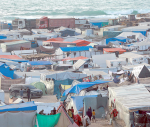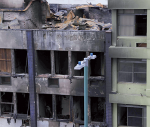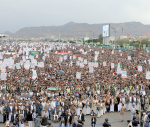You are here
Battle for Anbar will prove costly
Apr 14,2015 - Last updated at Apr 14,2015
The Iraqi government has initiated plans to recapture the western governorate of Anbar, most of which has been under Daesh control for more than a year.
Prime Minister Haidar Al Abadi announced that the army’s next mission, after the liberation of Tikrit last month, will be to clear Daesh militants from Anbar. The decision to launch the operation will be taken within the coming days or weeks.
But if clearing the small city of Tikrit took more than three weeks to complete — some say it would have taken more had it not been for the US-led coalition air cover — the battle for Anbar will prove to be more difficult and costly.
Covering an area of more than 140,000 square kilometres of sparsely populated desert that extends from the banks of the Euphrates in the east to the borders with Jordan, Syria and Saudi Arabia in the west, northwest and southwest, Anbar is known for its tough Sunni tribes.
With a population of about 1.5 million, Anbar represents the western gateway to Baghdad, with major highways going through it linking Iraq’s capital to Amman and Damascus.
After the American invasion of Iraq in 2003, Anbar emerged as a major military challenge for the US army: i.e., the battle of Fallujah.
After the fall of Saddam Hussein, the governorate became a home base for former Baathists, Islamist extremists and eventually Al Qaeda militants and other insurgents. All opposed foreign occupation.
The bombing of Fallujah by US troops is still remembered as one of the bloodiest episodes of the American occupation of Iraq. Between 2005 and 2008, Gen. David Petraeus created the Anbar Awakening groups, made up of Sunni volunteers, which became a force of more than 50,000 and was instrumental in chasing out Al Qaeda fighters from the governorate.
But when Awakening fighters were handed over to the Iraqi government in 2008, former prime minister Nuri Al Maliki was quick to disband them for fear that they would launch an insurgency against the Shiite-led rule.
Later, he ignored demands and calls by Sunni chiefs that they be included in the army and have a fair share in government. This led to mass protest in 2013, which Maliki crushed by using force.
It is this feeling of betrayal by the Baghdad government that is thought to have facilitated the quick infiltration by Daesh militants of the governorate.
Today they control more than 60 per cent of Anbar, including Fallujah, Hit, Qaim and Rawa, parts of Haditha and areas around Ramadi, the provincial capital.
But Sunni tribes are divided between those who support Daesh militants for fear of Shiite incursion and retribution, and those who are willing to back the Iraqi army’s campaign to liberate the governorate.
Baghdad’s promise to arm and train Sunni volunteers remains unfulfilled.
Reports speak of only 1,500 Sunni fighters who have received light weapons and few rounds of ammunition from the government.
Anbar officials complain that the army has been slow in responding to calls to send additional troops and heavy armour to defend Ramadi against Daesh attacks.
And in the wake of claims that Shiite militias carried out atrocities against Tikrit residents after its liberation, in addition to looting and burning of shops and houses, Anbar Sunnis have called on Abadi not to allow the so-called Popular Mobilisation forces, composed mostly of Shiites and allegedly led by Iranian officers, to participate in the battle to free the governorate.
The Iraqi parliament has failed to approve a law to create the so-called National Guard, which is supposed to be made up of local militias to support the Iraqi army. There is resistance in Baghdad to the idea of arming the Sunnis.
But freeing Anbar remains a strategic goal if the army is to cut Daesh supply routes to Mosul, Iraq’s second largest city.
The battle for Mosul cannot begin unless Anbar is cleared of Daesh militants first.
The bitter experience of Sunnis in liberated Tikrit and other places will make it difficult for the government to get the local backing it needs. It is also hesitant to send Shiite militias into Anbar.
Jordan is watching events in Anbar with heightened anxiety.
Defeating Daesh militants there will secure the Kingdom’s eastern borders and restore links with Sunni tribes; many of its leaders have sought refuge in Jordan.
Chasing Daesh militants from Anbar will also degrade its communication lines with eastern Syria, where they remain strong.
Winning Anbar is an essential link in the long fight to defeat and eradicate extremists.
But Abadi must find ways to restore Sunni confidence in his government if his upcoming campaign in Anbar is to succeed.
Still, the battle for the governorate will be difficult and could determine Iraq’s future.
The writer is a journalist and political commentator based in Amman.













